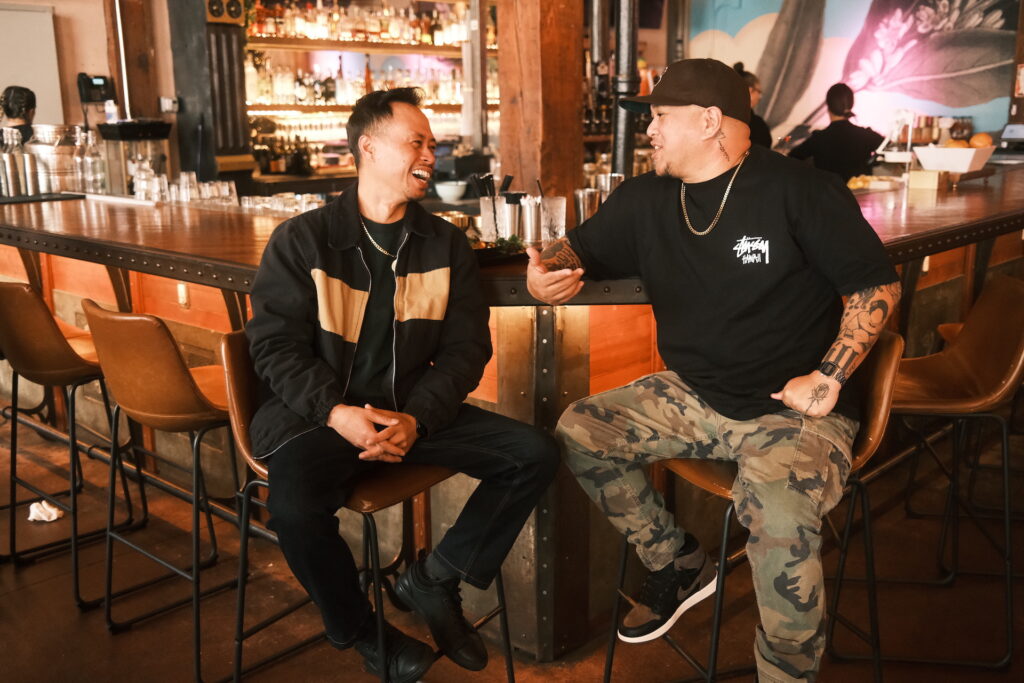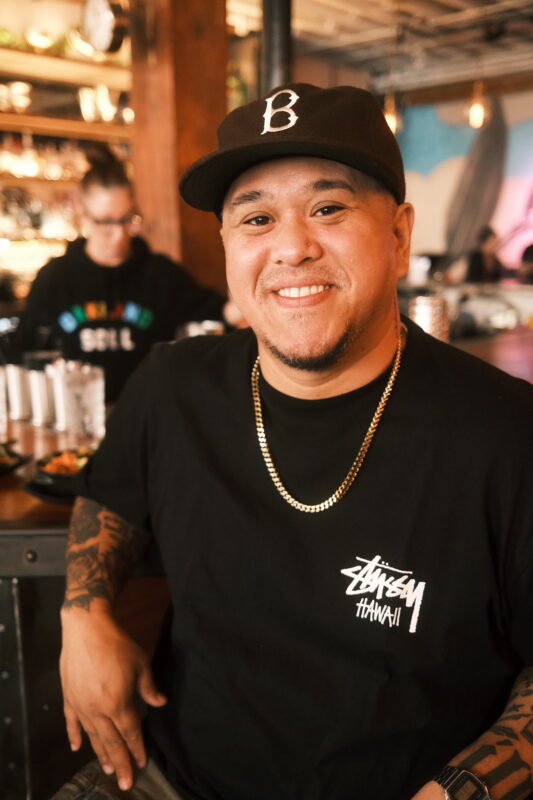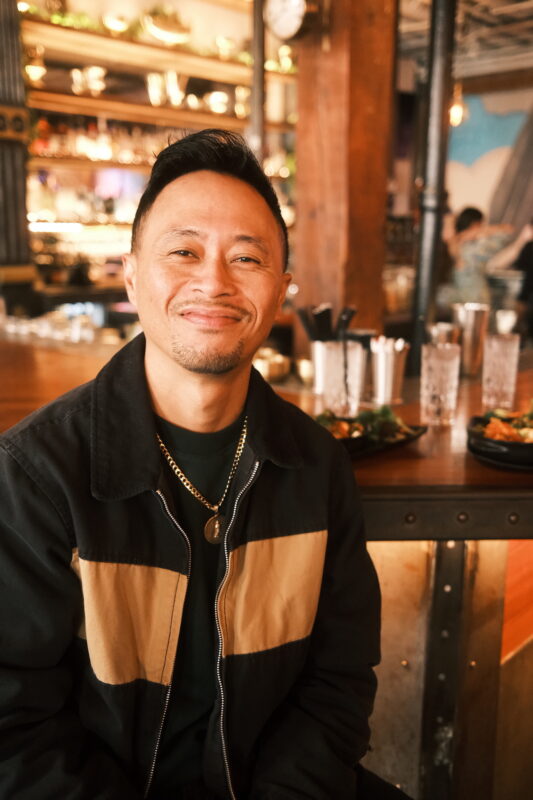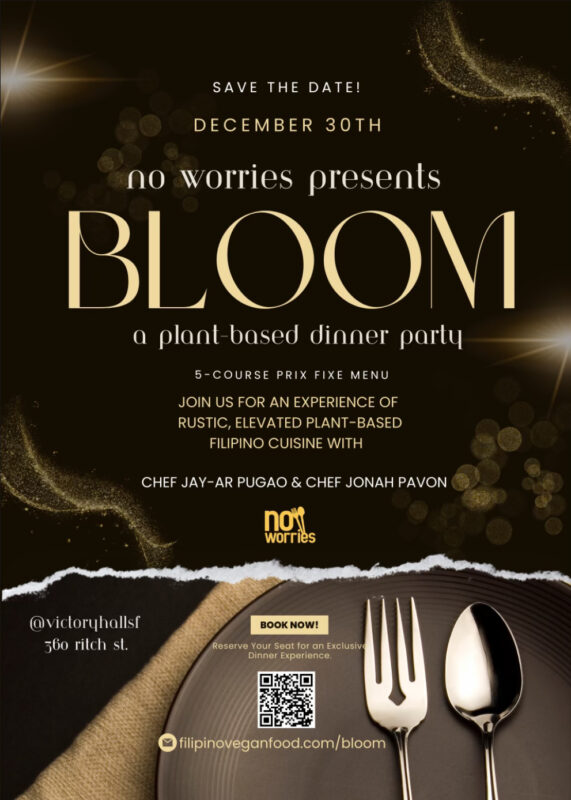‘Bloom’ elevates Filipino comfort food to plant-based fine dining experience
SAN FRANCISCO – “Bloom,” a dinner party featuring plant-based Filipino cuisine, happens this Saturday, Dec. 30 with two seating times, 6:30 p.m. and 7:00 p.m., at Victory Hall in the fabled Ritch Street alley in San Francisco’s SOMA South Beach neighborhood.
Presented by No Worries, Filipino Vegan Cuisine and produced by Gregory Manalo, “Bloom” features a five-course prix fixe menu that Chefs Jay-Ar Pugao and Jonah Pavon describe as “an experience of rustic, elevated plant-based Filipino cuisine.”
“Bloom” is about elevating classic Filipino comfort food to a plant-based fine dining experience.
“Filipino food has always been comfort food for me and (many) in my community,” says Pugao. “It’s really about taking the classic comfort food and showcasing it in different ways, innovative ways, while retaining the flavor profile of what we grew up eating.”
Pavon adds, “As we both have grown as chefs, we wanted to really showcase and highlight our take on innovation and creativity using the familiar backdrop of Filipino food. The techniques that we’ve picked up through the years and the experiences we’ve had as diners and going to different restaurants.”
Pugao and Pavon collaborated in designing the five-course tasting menu. It started with listing their favorite foods.
“It was a combination of our favorites, the flavors we grew up with,” says Pugao.
Designing a five-course tasting menu
Pavon admits that collaborating on designing a five-course tasting menu “could be an ambitious thing.” But being close friends and having worked as line cooks together helped to get them on the same page.
Pugao and Pavon now work as a team at Stanford University, as chef and sous-chef respectively.
“So working together on a five-course tasting menu is super exciting for the both of us, just to get out of our normal day-to-day operational grind and to actually do the food that’s really personal for us,” says Pavon.

Chefs Jay-Ar Pugao and Jonah Pavon describe “Bloom” as “an experience of rustic, elevated plant-based Filipino cuisine.” Photo from Manalo Pictures
As Pavon puts it, the process of designing the menu is similar to curating the order of songs on an album.
“You want each song to be amazing on its own but you want the songs to follow each other nicely,” says Pugao. “So when we put the menu together, ‘these are our classics, these are our favorites, but how does it follow each other?’ contextualizing it flavor-wise. As a diner, you can appreciate how you move through each dish.”
The five-course tasting menu for “Bloom” will be a surprise. Diners who have reserved their seats for either of the evening’s two seatings have the option for either a mocktail or a wine pairing, in collaboration with Victory Hall’s sommelier, to go with each dish.
“They’ll just work through the menu and enjoy the drink, enjoy the vibe and have a complete experience where you’re eating something delicious, you’re hearing some great music and you’re enjoying the environment,” says Pugao. “The menu that we’ll have on teach table will have the title and description of each dish.”
Working with a non-vegan chef
The concept behind “Bloom” is rooted in Pugao’s No Worries enterprise. As a vegan chef and a purveyor of Filipino vegan cuisine, it was not a surprising left turn for him to work with Jonah, a non-vegan chef.
“Jonah came to mind because Jonah and I have worked together closely for the last five to six years,” Pugao says. “I’ve really gained insight on how Jonah eats and how he processes flavor profiles. It’s actually really amazing to witness because Jonah has done different cuisines. I pitched this idea to him with the intention of him bringing to the table all of his experiences.”
Working with Pugao and his extensive knowledge of vegan cooking is exciting for Pavon.

Jonah Pavon says “Bloom” is “like going to a Filipino party but all of the aunties worked in fine dining.” Photo from Manalo Pictures
“The exciting part is, how do Jay-Ar and I recreate those feelings of nostalgia and tap into memory of familiarity but do it in a way that I’ve never done before which is vegan,” says Pavon.
“There’s the excitement of how do we execute these dishes to where you don’t even think about missing the meat.”
Pavon shares that what he loves about Pugao’s cooking is “that it tastes like the food that I ate growing up but I’m not looking for chicken or I’m not looking for a piece of pork, all of the flavors are there.”
“So it hits every box in my head of what this dish is, adds Pavon. “These flavors are so deeply burned into our brains and into our palettes.”
A pioneer of Filipino vegan cuisine, Chef Jay-Ar Pugao, executive chef of No Worries and the first-ever vegan chef hired by Stanford University, has been living plant-based for over 25 years.
Vegan journey
This journey started in his teens when his mother had a heart attack in 1992.
“I grew up understanding that my mom had this heart attack because of how we ate, because of our diet,” says Pugao.
“And so when I was 16, that’s when I went vegetarian. I figured, if I am vegetarian and if I’m not eating all the meat and all of the high cholesterol, all the saturated fats, then I’m going to force my mom to cook and eat the same way. That was the true intention of what I was after, I just wanted my mom to eat and cook healthier for our whole family.”
Then, at 17, Pugao had an epiphany when his mother cooked afritada.
“I’m going to maybe eat the sauce, eat the potatoes, eat the carrots, and there was, what I thought, a piece of chicken and I’m like, ‘I’m not eating that,’ and she was like, ‘No, eat that,’ and, ‘No, mom. I’m not eating that,’ and she goes into the garbage and she pulls out this pack. It was for this veggie meat, this veggie chicken that she had used,” Pugao says.
“I looked at the pack and I’m like, ‘What is this?!’ And I read the ingredients (and they’re) soy based, it’s all plant-based and I’m like. ‘Oh my god! What is happening?!’ I’m excited, I ate the afritada, and I grubbed so hard, I remember eating that meal. I felt it in my bones. This is something people need to eat.”
It was the reason why he wanted to learn how to cook and it was the first dish he learned how to make.
No Worries
Pugao and Gregory Manalo have known each other since their high school days in Oakland. In 1998, they started No Worries as a high school project.
“We did this business class where we were supposed to do a mock business and write out your goals, your cost of goods, how you would market, everything about starting a business,” says Pugao.
They eventually won a $500 grant for their business idea.

Jay Ar Pugao’s journey as a vegan started in his teens when his mother had a heart attack, and he wanted her to eat healthy. Photo from Manalo Pictures
Pugao took some of the grant money and bought two industrial pots that he still uses to this day.
“They’re amazing pots, actually. Meant to last. I bought pots and I just started catering for people,” he says.
Jonah Pavon learned how to cook rice as a kid growing up in Fremont.
“My culinary journey started before I knew it started,” Pavon says. “I had to cook rice when I got home, make sure we had rice for dinner. That was my task, and then slowly worked my way around the kitchen.”
His mother’s palette
What’s integral to Pavon’s point of reference when it comes to Filipino food is his mother’s palette.
“My mom had a really strong palette and she cooked really well,” he says. “The flavor, the balance between acidity and savory, and salty. A lot of these things she was teaching me; what proper Filipino food should taste and feel like. It should feel like home, but it should feel exciting.”
At 15, Pavon had his first job as a dishwasher at the local pizza spot by their house. Then, from washing dishes, he moved on to prepping.
“And I was like, ‘cooks are getting paid nothing, all the money is in the front of the house.’ So I started working front of the house, bar back, server,” says Pavon.
All of Pavon’s jobs were always food related and, while in college, he had “a moment of clarity.”
“My mom never stressed what I should do but she stressed that I should do something,” he says. “Because I’ve been doing it for so long, I knew that food was something I could do every day for the rest of my life and I would be OK. Not only would I be OK, but I would be happy doing that. So I took the leap, I went to culinary school.”
After finishing culinary school, Pavon tested his chops by working in corporate dining in San Francisco.
“You learn pretty fast that culinary school was cute but a high-volume functioning kitchen is not a classroom. You gotta earn your keep, you gotta pull your weight,” he says.
“So the honeymoon stage was pretty small. Thankfully, I learned quick. Thankfully, I have the drive that my family instilled in me, you know, if it’s worth doing, it’s worth doing. Those experiences built a lot of resilience in the way I work with food.”
He moved on to other restaurants and became a sous chef in Oakland.
“It opened me up. It’s not just about cooking, it’s also about managing people,” he adds. “It’s also how to get the best out of the people I am working with.”
Crossing paths at Facebook
At some point in his career, Pavon landed a job at Facebook. On his first day at work, he was in a menu meeting. And Jay-Ar Pugao walked in and sat right in front of him.

“Bloom” is about elevating classic Filipino comfort food to a plant-based fine dining experience. It happens this Saturday, Dec. 30 with two seating times, 6:30 p.m. and 7 p.m., at Victory Hall in San Francisco. CONTRIBUTED
“I was looking at this dude and I was like, ‘I know this dude.’ Him and I know each other from Bindlestiff Studio. I knew he was doing No Worries,” says Pavon.
“So we knew each other but we weren’t tight and it wasn’t until we got to Facebook where we really knew each other and started working together.”
Pavon and Pugao worked together as line cooks at Facebook.
“Working with another line cook, you develop a bond; and that bond is birthed from high stress and high expectations,” says Pavon. “We just really solidified a personal friendship.”
After a few years at Facebook, Pugao moved on to become the first vegan chef at Stanford while Pavon stayed behind. Then the pandemic hit.
“At that point I was just taking calls from home as a chef; that makes you feel kind of useless. Our value comes from the food that we cook. That’s where a chef really gets to be a chef; to cook for people, to nourish people,” Pavon says. “And during COVID I wasn’t doing that at Facebook.”
Eventually, Pugao told Pavon that Stanford was looking for sous chefs. Pavon applied and got the job.
“Him and I have been working at Stanford since then,” he says. “A lot of our connection is based around food and feeding people.”
“Bloom” is a culmination of their intersecting culinary journey, informed and honed by years of real-world experience and rooted in heritage and culture.
“It’s like going to a Filipino party but all of the aunties worked in fine dining,” says Pavon. “It’s an approach to food that is representative of our food knowledge and our skills as craftsmen but, at the end of the day, it could look beautiful and it could be stunningly plated but if that adobo don’t adobo, it ain’t adobo, man.”
“Spices make the world go round and flavors come from plants,” says Pugao. “Come and experience something fresh.”

